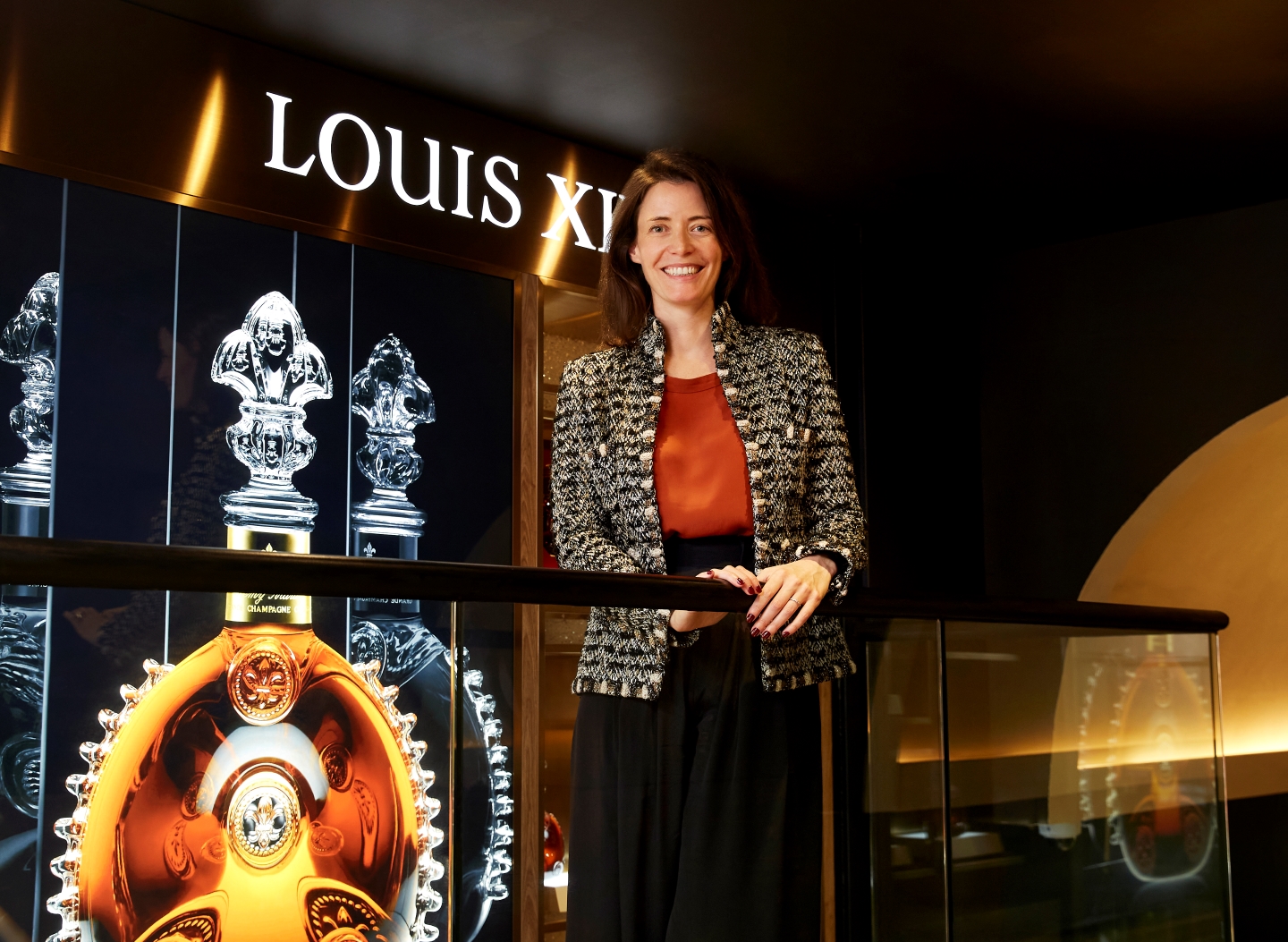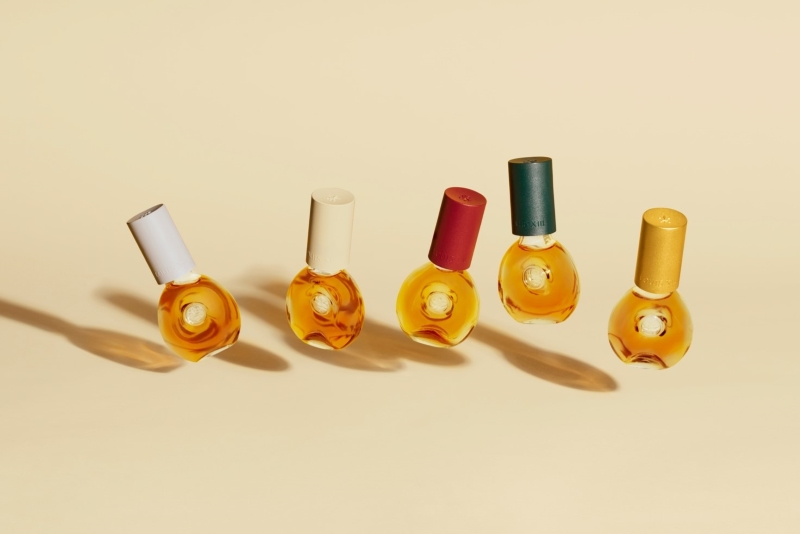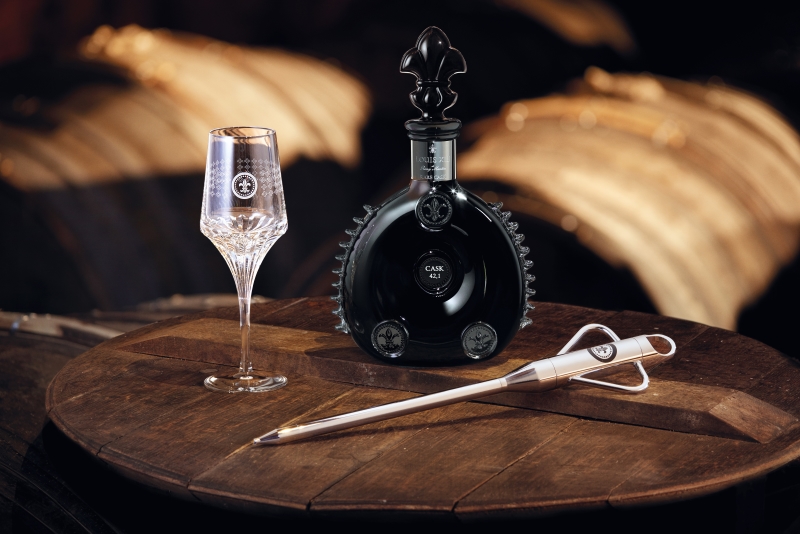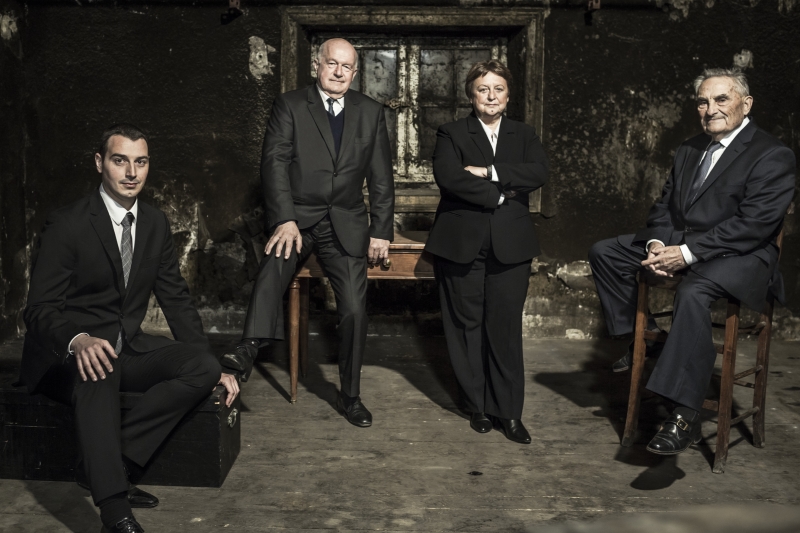
For executive director Anne-Laure Pressat, creating the cognacs of tomorrow injects purpose into the present (Photo: Soo Phye)
The mark of a life well lived is arguably the legacy each of us wants to leave behind once our time on Earth is up. From small family heirlooms to entire dynasties forged through blood, sweat and tears, these footprints serve as a way of saying “I was here” while bequeathing our descendants tools to help them reach even greater heights or are simply mementoes of past glory.
Some bodies of work, however, are impossible to be completed in a single lifetime, especially when a project is set in motion not for its current custodians, but their progeny. There is a Greek proverb that goes “A society grows great when old men plant trees whose shade they know they shall never sit in”.
Anne-Laure Pressat, executive director of Louis XIII, certainly knows a thing or two about creating something for tomorrow. Sitting in a rouged and gilded VIP room of The Chamber at The Starhill, Kuala Lumpur, her black-and-white tweed jacket paired with dark slacks scream business. But the bright twinkle in her eye hints at the zealous personality that has seen her through a 12-year career with the Rémy Cointreau group. Working from the ground up as a fresh-faced intern, she spent six months in Paris and then crossed the channel to become Louis XIII brand ambassador in London. Five years later, she returned to France to join the central team, where she was appointed brand manager and head of innovation, before stepping into her prior position as head of innovation and sustainable development.
Even though her early years can sometimes feel like a lifetime ago, Pressat remembers each of her previous roles with unfading enthusiasm, all of which serve as building blocks of her deep-rooted commitment toward the Louis XIII legacy and passion for cognac. “I loved those days because I was out on the field,” she recounts, with a sigh of wistful nostalgia. “I always say to my team that one day in the field is equivalent to three cooped up, because there you are in front of the customer, the clients — in front of reality. You get to see people’s reactions and emotions, and you learn so many soft skills that would have taken longer to pick up in the office. I am so grateful I had those years.”
terroir.jpg

The dream job
“When you work for a brand as fabulous as Louis XIII, it opens so many doors,” Pressat notes as she remembers her time spent with the cognac line, which dates back to 1874.
A single drop of the amber liquid, lauded as the “King of Cognacs”, takes a century from grape to decanter. Each ornate Baccarat crystal bottle, instantly recognisable by its curved shape accented with 10 spikes on each side and a fleur-de-lys stopper, is the culmination of passion and hard work poured into the house over lifetimes. Across departments, from the blending team to the C-suite, all of whom dedicate their lives to the pursuit of the most coveted cognac in the world, understand that the efforts they put in today can only be savoured a century later.
As bittersweet as this sentiment may be, individuals like Pressat are not discouraged nor daunted by the thought of spending precious time and energy creating an end product they will never see or experience in their lifetime. Rather, it keeps them going. “I have Louis XIII in my blood,” she says. “I started young and this is passion-driven for me. I’m lucky I don’t call it a job. It is really something I love, rather than something I just do.”
Her current position as executive director is a stark 180° change from her internship days. “Now, I’m in front of the computer, working with all the departments and markets — the production in Cognac, France, the quality control team, our crystal partner, finance and innovation,” she laughs, remarking how surprisingly balanced her work today is as it allows her to be involved in all parts of the business.
Time and again, she has encountered many challenges, several of which continue to influence her today. With each, the core ethos that makes Louis XIII such a revered yet revolutionary house becomes clearer. “My last placement before taking over as executive director was director of innovation. I thought, ‘My job is to innovate Louis XIII, but I cannot change the decanter or the liquid. What can I do?’”
The answer came in the form of several trailblazing campaigns she helped spearhead. One of them, the Infinity Experience, introduced an unprecedented refill service that allows customers to bring their empty decanters to the headquarters in Cognac where they may be cleaned, engraved and refilled an endless number of times. The taste and quality of the spirit remains unchanged, but this process enables each bottle to be reborn and, with care, used for eternity.
louis_xiii-photo-visuel-image-louisxiii_the-drop_packshot-composition_1-2.jpg

“We have the mission to preserve Louis XIII. It will never change. The iPhone may not be here in 100 years, but Louis XIII will. It was all about nourishing the brand without changing its core elements,” Pressat explains. “The question was always: How do we continue to be pioneers? Because that is what we have always been about. In 1874, we created a super premium category, something completely new that didn’t yet exist. We have always been visionaries, so the challenge was: How can we stay true to our roots while modernising and challenging ourselves?”
Ground was broken once again with the launch of The Drop — a series of chic, bijou 10ml bottles meant to appeal to a younger, on-the-go demographic. Sold as single units or a collection of five, the tiny flasks are topped with caps coloured to evoke certain moods, and can be fitted with a leather case and shoulder strap to be taken wherever the wearer desires.
Merging a heralded cognac line with sleek modern style was “disruptive and code-breaking”, Pressat says. It is an open invitation for the world’s nomads and adventure seekers to cast aside preconceived notions of the amber libation and how to enjoy it, and make it their own, departing from cognac’s reputation as an old man’s drink. The idea behind it was simple. “I said, ‘I want everyone to one day be able to taste Louis XIII’, and when it comes to Louis XIII, just one drop is enough,” Pressat quips.
Still, the most magical moments are “when there is new liquid”, aka Rare Cask, Louis XIII’s singular differing expression. Only three editions have existed in the brand’s 150-year history — 43.8 and 42.6, discovered by Pierrette Trichet, the first and only female cellar master among the major cognac houses, and the most recent 42.1, which marked current cellar master Baptiste Loiseau’s debut contribution to the iconic collection. Each version is created with the contents of a single hand-picked tierçon, left to age undisturbed until nature has worked its magic. Because of the rarity of suitable barrels, chancing upon even one can be the discovery of a lifetime.
It is particularly in the making of Rare Cask that Pressat feels most connected to the environment and concept of time. “It’s such a highlight because nature is so much greater than us, and our cellar master picks one cask to follow its will and develop by itself. I remember impatiently asking him about the progress, and he told me, ‘You need to wait! I’ll call you when the liquid is ready!’ And then that call finally came. It was a big deal for us, and we created an amazing launch in Venice with our best clients and media friends. It was very special because we had clients from all over the world, of various nationalities, tasting Rare Cask at this once-in-a-lifetime event.”
louis_xiii-photo-visuel-image-louisxiii_rc_craftsmanship_cognac_2.jpg

L’Art de vivre
From lavish celebrations to intimate social gatherings, cognac is known as an accompaniment to life’s best moments. Thanks to the nature of her job, which involves travelling to different markets, Pressat has her fair share of good memories spent over a glass or two in some of the world’s most intoxicating locations.
One that immediately comes to mind was the Habanos Festival in Cuba, years ago when she was still based in the UK. She remembers how it all began: “Some of our big clients were asking me, ‘Anne-Laure, why aren’t you going to the Habanos Festival?’ I was like, ‘But I’m in London. How do I get to Cuba? How do I go to my boss and say I need to organise a tasting there?’”
But the call of the Caribbean was impossible to resist and, be it gut feeling or divine intervention, Pressat knew the festival was the place to be. “I built up a case, pitched it, and somehow my boss at the time agreed. So, I packed the decanter and glasses in my suitcase, wrapped in my clothes, and arrived just like that in Cuba. We did an amazing experiential session in a vineyard close to a tobacco leaf plantation. It was the most exotic tasting for Louis XIII, and at the time, there was so little to be found there — no champagne or cognac. Only cigars and rum! So when I got there, I said, ‘Louis XIII has marked every key moment in history. Today, that is in Cuba.’”
The global launch of Rare Cask 42.6 in Udaipur, India, is another incident that will never fade from Pressat’s mind. “We were on the lake and the Maharana came on a carriage drawn by six white horses to welcome us. He was dressed all in white, and it was like something straight out of a dream. He was so pleased, and even agreed to pose for selfies with our clients,” she chuckles.
It was here in the White City of Rajasthan that Pressat realised how Louis XIII is more than just a brand. It is a concept bigger than us made to endure all eras. “Louis XIII transcends time and space,” she comments. “It has been through the first flight on the Concorde, to New York, to Malaysia and so on. It graces every milestone, making it timeless. You can’t really give it an age. We — in Cognac, customers and the media — are all just passersby.”
This being a landmark year for the maison, more celebrations are undoubtedly in store. “We are revelling every day,” Pressat smiles. “With our clients and partners, we are always raising a glass to the next 150 years. For us, every day is an anniversary that invites us to think a century ahead.”
In Cognac, artefacts from the archives have been duly retrieved and displayed as part of a new customer experience. Visitors may browse through vintage edition bottles, menus, invoices and photos of VIPs and celebrities who have toasted with Louis XIII over the years — evidence of an unshakeable dedication to commemorating the past, looking forward to the future and the art of living well.
cellar_masters.jpg

Imagining the century ahead
It was in 1874 that Paul-Emile Rémy Martin first had the idea to “think a century ahead”. This sentiment, which has since become Louis XIII’s overarching brand statement, has greatly influenced the way it operates. “The business is family-owned,” says Pressat. “They don’t do it for short-term profit, but for their children and grandchildren... the future.”
And so, naturally, sustainability is a top priority across all production stages of Louis XIII — starting with the terroir, where slight changes in the delicate biodiversity and climate can easily spell abundance or scarcity for each annual harvest. The quality of the soil is directly reflected in the grapes and eaux-de-vie. Thus, environmental consciousness cannot be just a passing fad for Louis XIII, but a lifelong adherence.
Despite unending troubling news of melting glaciers and rising sea levels, Pressat does not view sustainability as an obstacle, but an opportunity to evolve with the times. “For all the work we do, I have a filter: What is the highest emotion we can invoke in our clients, with the lowest possible CO2 impact? I always try to abide by it,” she says.
In 2023, Rémy Cointreau introduced its revamped Louis XIII coffret. At first glance, nothing seems to have been altered. But the packaging is now crafted entirely from cellulosic material, reducing related carbon emissions by nearly 60%. Lighter and slightly smaller than its predecessor, it is not only eco-conscious but more practical for shipping and handling. “And it is still super beautiful, maybe even more than the old ones,” voices Pressat. “I think these new rules allow us to do things we have not done, while still providing the same, if not better, experience for our clients.”
The future she envisions for Louis XIII is a bright one, in which modern influences are embraced, yet old traditions and savoir-faire maintain prominence. In an age where many artforms, such as tierçon restoration and decanter crafting, are gradually lost to time as the practising generation dwindles and youths opt for different paths, this part of her work can at times feel like an uphill battle. But that has yet to faze her.
“To repair a tierçon, which is bigger than a regular barrel and made with wood that is at least 100 years old, we realised we needed to break another one. In 2011, our former cellar master, Pierrette, said we cannot keep doing this, because at some point, we won’t have any more. She initiated a new way of fixing tierçons, and we built a cooperage with three coopers who could produce them using the method. Thanks to this, we are able to keep this savoir-faire alive.
“We are all about preserving know-how. That’s what I love so much about the brand. It takes 100 years of craftsmanship to make one bottle. The notion of time is very unique to us, and we often say Louis XIII is the perfume of time. It is our raw material. So much happens in a century. It humbles you a lot to be part of it.”
As time passes, and Pressat looks forward to the years and projects to come, Malaysia often pops up in conversation. “I would love to set up a boutique,” she says. “Seeing all the beautiful malls here carrying the best brands, I love the idea because we would be able to welcome our local clients and share more amazing experiences. Of course, we want to continue being in all the best bars and restaurants, but a boutique would be a nice starting point to take things further. Or, at least a pop-up!”
Records of when the amber courage first reached our shores date back as far as the mid-1800s. It was a popular digestif among British residents during the colonial period and the spirit of choice for Chinese merchants as they entertained clientele and toasted to fortune and prosperity. This culture, characterised by festivities and auspiciousness, catapulted Malaysia as second only to China among Asia’s largest markets. Now, cognac is found in the country’s most prestigious hotels and the swankiest bars and restaurants in town. Those who indulge are likely to have been introduced to the top-flight tipple by a family elder.
This sense of community, transcending generations, is a key element that fuels the fire for Pressat. “I’ve met so many clients who drink Louis XIII because of their fathers and those before them. It’s a transmission of tradition and heritage. I’m endlessly impressed by our cellar master, Baptiste, who is putting away eaux-de-vie for the next generation. Today, he is blending the liquid inherited from the fifth and sixth generations. It’s not just one person’s work, but extended teamwork over a century,” she says.
“Making Louis XIII is like building a cathedral. You will never see the end of it, but it marks history and is here to stay forever.”
Let’s drink to that, shall we?
This article first appeared on Oct 28, 2024 in The Edge Malaysia.


